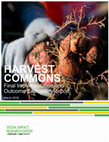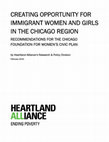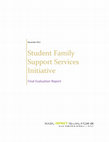Papers by Social IMPACT Research Center at Heartland Alliance
Illinois is among the first states in the nation to pass retirement savings legislation in the fo... more Illinois is among the first states in the nation to pass retirement savings legislation in the form of Secure Choice. With the implementation of Secure Choice, workers in Illinois at qualifying businesses without access to an employment-based retirement plan will be automatically enrolled in a retirement savings program. An estimated 1.3 million Illinoisans who currently do not have access to workplace retirement plans will be potentially impacted by Secure Choice. As Illinois moves toward Secure Choice implementation,however, there are a number of key questions that should be answered to help ensure that the program is addressing barriers to participation, especially among low-income workers, women, immigrants, and workers of color. This research is aimed at better understanding these barriers.
To be homeless is to live on the streets. Or in a Housing Forward shelter. Or on someone's couch.... more To be homeless is to live on the streets. Or in a Housing Forward shelter. Or on someone's couch. In Oak Park, more than five percent of our residents live in extreme poverty, making less than $9,000 a year. About 15 percent of our residents are food insecure, meaning they don't know where they will get their next meal. Too many live one missed rent payment from eviction—and homelessness. The homeless are not just on our streets. They are our classmates at school, and our parents and friends from work or church or baseball teams. They are members of our community. In all, about 200 kids in elementary schools and high schools are homeless. They are living with friends or relatives sleeping on couches with no permanence. The Oak Park Homelessness Coalition is working to change that.
Together, we can end homelessness in Oak Park.
Funding for permanent supportive housing is threatened in Illinois, and the Medicaid system is a ... more Funding for permanent supportive housing is threatened in Illinois, and the Medicaid system is a potential way to bring in federal money to support this critical resource. This study documents barriers to accessing the Medicaid system for permanent supportive housing providers in Illinois and calls for reform for Illinois's Medicaid rules.

This report is the final outcome evaluation of Harvest Commons, a supportive housing program on t... more This report is the final outcome evaluation of Harvest Commons, a supportive housing program on the near west side of Chicago that offers an enhanced, health-focused model of supportive services. Along with typical services such as case management and employment support services, residents of Harvest Commons -- virtually all of whom had been homeless -- have the opportunity to participate in on-site urban farming, nutritional counseling, and cooking classes. Through surveying and interviewing staff and residents and analyzing program data, IMPACT learned that Harvest Commons has had a positive impact in many different areas of residents' lives. The enhanced, health-focused model appears to have led to more positive health outcomes, and the collaborative model of service provision has created both special opportunities and challenges in creating cohesive, seamless, and impactful programming for residents. Read more about the findings and IMPACT's recommendations in the full report.
Schools provided only 36.2 PERCENT of federally funded breakfasts needed to reach low-income Illi... more Schools provided only 36.2 PERCENT of federally funded breakfasts needed to reach low-income Illinois schoolchildren in 2013-2014, meaning hundreds of thousands of children were at risk of going hungry in the classroom. Illinois' low utilization rate of the National School Breakfast Program results in fewer federal dollars for school districts -- Illinois leaves $90.4 MILLION in federal funding on the table because schools do not serve breakfast.
This Social Return on Investment (SROI) analysis compares the public and private investment into ... more This Social Return on Investment (SROI) analysis compares the public and private investment into the Illinois nonprofit youth development field to the social and economic value it creates for the youth and families who experience the programs and for society as a whole. Almost $302 million is invested in over 275 Illinois nonprofits that do direct service youth development work, and those groups serve 1.2 million youth each year. Every dollar invested into the Illinois nonprofit youth development field generates an estimated $45 in socio-economic value.
While the Great Recession introduced unemployment and underemployment to the masses, its signific... more While the Great Recession introduced unemployment and underemployment to the masses, its significant negative trends aggravated already declining rates of employment in Michigan, particularly among less-educated, young, male, and minority individuals, who were then also hit hardest by the recession. As the nation began to slowly recover after the recession, Michigan continued struggling to find an economic foothold. The State of Michigan, along with private funders, responded with the Michigan Earn and Learn program, with the goal of creating opportunities for people facing barriers to employment to pursue education and occupational training that could help them get ahead. This evaluation report of the Michigan Earn and Learn transitional jobs program was commissioned by The Joyce Foundation on behalf of the State of Michigan.

This Social Return on Investment (SROI) analysis compares the public and private investment into ... more This Social Return on Investment (SROI) analysis compares the public and private investment into the Illinois nonprofit environment field to the social, environmental, and economic value it creates for people who live in Illinois and for society as a whole. What does this investment in Illinois's environment yield?
Every dollar invested into the Illinois nonprofit environment field generates an estimated $58 in socio-environmental-economic value.
$45 of this socio-environmental-economic value accrues to the people of Illinois.
$13 of this socio-environmental-economic value accrues to society through increased tax revenue, increased spending in the state due to environment sector jobs, and avoided spending to treat costly environmental problems.
The real utility of an SROI lies in its ability to reveal if and how our investments into programs pay off. And on that, this SROI of the nonprofit environment field in Illinois is clear: investing in the environment yields dividends.

In partnership with the Chicago Foundation for Women, Heartland Alliance's Research & Policy Divi... more In partnership with the Chicago Foundation for Women, Heartland Alliance's Research & Policy Division sought to understand what economic, health, and violence-related issues are most pressing for immigrant women in the Chicago region, their families, and their communities. These findings are the result of a research and information gathering process with Chicago-area immigrant women, social service providers who work with immigrant communities, a literature review on related topics, and a scan of change efforts in other states and localities related to issues impacting immigrant women and their families. This report documents the key issues facing immigrant women in the Chicago region and prioritizes those concerns into actionable micro- and systems-level recommended change efforts. The Chicago Foundation for Women is building the concerns of immigrant women into their Civic Plan, and other community organizations and advocates can learn from the voices of impacted women themselves to ensure their efforts are aligned with the true needs and desires of the community.

This report examines an important aspect of economic racial disparity -- disparity in credit scor... more This report examines an important aspect of economic racial disparity -- disparity in credit scores. The relationship between credit scores and minority presence illustrates a clear racial disparity in credit in Illinois. Though many related factors help to explain some variability in credit scores, even when controlling for them, racial differences in credit persist. Having a credit score is important for gaining access to things like education, better jobs, homeownership -- the very things that feed financial and social opportunity. While credit disparities exist in large measure due to the same historic policies that have limited access to broader financial opportunities for minorities, credit scores are particularly important to consider because they also impact individuals' future financial opportunities. In effect, credit scores can create a trap, one that minorities are more likely to fall into, thereby feeding the continued growth of income and wealth disparities.
In order to respond to local needs and to reach the goal of ending homelessness, McHenry County's... more In order to respond to local needs and to reach the goal of ending homelessness, McHenry County's homeless system spent 2015 engaged in a process to create a plan to end homelessness for McHenry County.This report captures McHenry County's plan and the work ahead. This new plan for McHenry County embodies strategic thinking around targeting resources to those most in need and likely to benefit through coordinated assessment; integrates and promotes best practices across housing and service interventions; and it identifies new partners, in new areas, to help seize critical opportunities and to leverage more support for the homeless system.
This Social Return on Investment (SROI) analysis compares the public and private investment into ... more This Social Return on Investment (SROI) analysis compares the public and private investment into the Illinois nonprofit youth development field to the social and economic value it creates for the youth and families who experience the programs and for society as a whole. Almost $302 million is invested in over 275 Illinois nonprofits that do direct service youth development work, and those groups serve 1.2 million youth each year. Every dollar invested into the Illinois nonprofit youth development field generates an estimated $45 in socio-economic value.
A group of Chicago youth media organizations have embarked on an evaluation process with adult pr... more A group of Chicago youth media organizations have embarked on an evaluation process with adult program alumni to assess the degree to which hands-on media production and dissemination contributes to developing productive, independent, and engaged citizens. This report sets the stage for the evaluation, which began in late 2012 and will ran through 2013, highlighting the work of youth media organizations in Chicago and exploring six dimensions, or outcome areas, that youth media organizations work within: journalism skills, news/media literacy, civic engagement, career development, youth development, and youth expression. Read the final evaluation published in 2014, "Life After Youth Media: Insights About Program Influence into Adulthood." (http://socialimpactresearchcenter.issuelab.org/resource/life_after_youth_media_insights_about_program_influence_into_adulthood)
The Social IMPACT Research Center (IMPACT), at the request of the Greater Chicago Food Depository... more The Social IMPACT Research Center (IMPACT), at the request of the Greater Chicago Food Depository, conducted a geographic analysis of primarily federally-funded nutrition programs that target older adults. The goal of the project is to better understand what Chicago Community Areas and Suburban Cook County townships are most underserved by federally-funded nutrition programming in relation to the number of older adults likely to have need for food assistance.

The Student Family Support Services Initiative (SFSI) provided intensive case management and hous... more The Student Family Support Services Initiative (SFSI) provided intensive case management and housing assistance to families with children who were identified as residing in "doubled-up" living situations (e.g. living with relatives or friends because they had lost stable housing but were not yet in homeless shelters or cycled out of shelters) and considered at risk of becoming homeless by the Chicago Public Schools (CPS) in 2009 and 2010. The program offered case management, housing assistance, and a menu of services that families might need to stabilize in housing including therapeutic services, employment services, and asset building. The theory of change was that addressing a family's primary housing and employment needs would positively impact the educational stability and achievement of students, while at the same time benefiting the family overall. This report, prepared by the Social IMPACT Research Center, presents a final evaluation of the initiative.
This study estimates the economic benefits of cases closed by seven legal aid providers in 2010. ... more This study estimates the economic benefits of cases closed by seven legal aid providers in 2010. It also provides a picture of the level of economic disadvantage experienced by clients who benefited from legal aid using data on clients' average household size and income.
This brief summarizes anti-poverty policy simulations conducted by the Urban Institute for the Il... more This brief summarizes anti-poverty policy simulations conducted by the Urban Institute for the Illinois Commission on the Elimination of Poverty.
As Illinois struggles to recover from the worst recession in two generations, job growth and incr... more As Illinois struggles to recover from the worst recession in two generations, job growth and increased economic activity are of paramount concern to voters and lawmakers alike. The recent data make a clear and compelling case that cutting expenditures on human services in this environment would be counterproductive. It would be far better for state government to maintain human srvices spending and gain the positive effects on the Illinois economy.
Faced with an increase in the number of people experiencing homelessness and a system strained do... more Faced with an increase in the number of people experiencing homelessness and a system strained doing what it can to address the issue, service providers, shelter and housing providers, community members, faith-based organizations, and funders created "No Place Like Home, a Plan to End Homelessness for Porter County". The plan lays a foundation to retool the homeless service system to most effectively prevent homelessness and rapidly re-house people experiencing homelessness.







Uploads
Papers by Social IMPACT Research Center at Heartland Alliance
Together, we can end homelessness in Oak Park.
Every dollar invested into the Illinois nonprofit environment field generates an estimated $58 in socio-environmental-economic value.
$45 of this socio-environmental-economic value accrues to the people of Illinois.
$13 of this socio-environmental-economic value accrues to society through increased tax revenue, increased spending in the state due to environment sector jobs, and avoided spending to treat costly environmental problems.
The real utility of an SROI lies in its ability to reveal if and how our investments into programs pay off. And on that, this SROI of the nonprofit environment field in Illinois is clear: investing in the environment yields dividends.
Together, we can end homelessness in Oak Park.
Every dollar invested into the Illinois nonprofit environment field generates an estimated $58 in socio-environmental-economic value.
$45 of this socio-environmental-economic value accrues to the people of Illinois.
$13 of this socio-environmental-economic value accrues to society through increased tax revenue, increased spending in the state due to environment sector jobs, and avoided spending to treat costly environmental problems.
The real utility of an SROI lies in its ability to reveal if and how our investments into programs pay off. And on that, this SROI of the nonprofit environment field in Illinois is clear: investing in the environment yields dividends.